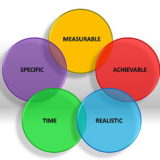SMART objectives – for a results-driven strategy
SMART objectives are applied to develop a pertinent, results-driven marketing strategy.
SMART objectives – let’s decode it:
Specific: a clear and well-defined goal stating exactly what should be achieved. Answers: WHAT (what needs to be accomplished), WHY (why it is important), WHO (who is involved), WHERE (where the goal is located)
Measurable: a goal which can be obtained and quantifiable described. Measurements include metrics, milestones, results, budget.
Achievable: means that the objective can be achieved with suitable skills, resources and known constraints. Four variables need to be taken into consideration: SKILLS (how the goal can be accomplished), RESOURCES (what is the budget allocated to achieve this goal), TOOLS (the goal has to be estimated, if it is realistic, given the constraints), TIME (how many hours need to be spent to achieve the goal)
Relevant: the objective has to have an added value within the context it is set; it needs to be also aligned with company strategies and higher goals. It have to be taken into consideration: NEED (if it is worthwhile), OBJECTIVES (if it fits into other efforts), VALUES (if the team is right to achieve it), GOALS (if it is applicable in the current environment)
Time-bound: it can be achieved in the set time frame. It needs to be taken into consideration: CREATION OF FOCUS (what must be achieved today), MILESTONES (what can be done i.e. six weeks from now), DEADLINES (what is the time frame necessary to achieve this goal?)

